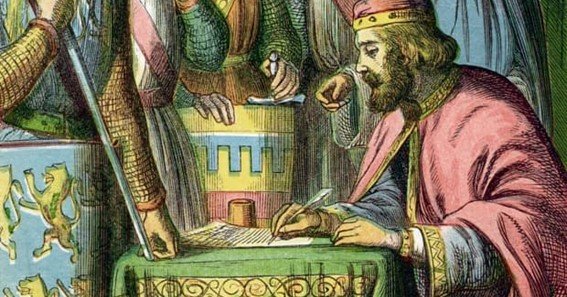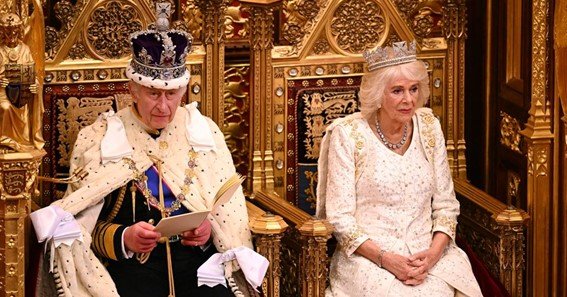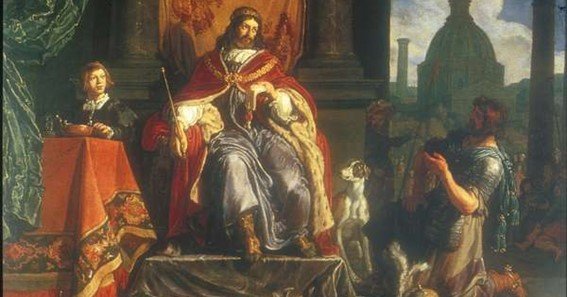What is divine right? Divine right is a sovereign’s right to rule, according to the view of governance that a monarch obtains the right to rule directly from God and not from the people. The monarchy has a long history of divine right. It claims God gives kings and queens power. This concept has traditionally supported royal rule and prevented throne challenges. Comprehend the sacred right to comprehend monarchies’ evolution, faith, and government relationship. Here we discuss what is divine right and more about it.
What Is Divine Right?
Divine right is a sovereign’s right to rule, one theory of governance holds that a king rules directly from God, not the people. God chooses kings and queens who answer to him, not their people, according to divine right. It is believed that the king or queen is God’s chosen agent on Earth and wields holy, untouchable power. This idea has protected kings from accountability and dismissal. Divine right was popular in medieval and early modern Europe because it legitimized kings. By stating God approved of their reign, rulers could gain obedience and loyalty, strengthening their influence over the church and state. This concept of divine authority transformed government and how individuals interacted with power, creating a lasting effect.
Facts About Divine Right

The divine right has transformed kingdoms and governments. The concept is that a monarch or queen’s power originates from God-supported absolute rule. As we already discuss what is divine right, now knowing the effects, and demise of divine right can help you comprehend how church and state have changed and how contemporary political philosophy has formed.
Roots And Society
Ancient societies believed their rulers were gods or goddesses, and therefore had divine right. This belief was popular in medieval Europe, especially during the Carolingian and Holy Roman Empires. Religious and philosophical changes shaped divine prerogative throughout the centuries. In Europe, the strong relationship between church and state provided monarchical rule with a religious basis, making divine right easier to accept. At its peak in the Middle Ages and Renaissance, the notion transformed politics.
Important Backers
Kings James I of England talked about divine right, and Louis XIV of France, who ruled absolute, believed in it. In “The True Law of Free Monarchies” and “Basilikon Doron,” King James I wrote that God made kings above the law. “L’état, c’est moi” (“I am the state”) was a famous remark from Louis XIV, the Sun King. He centralized power and ruled without checks, following divine prerogative. The ideology helped monarchs and queens justify their power and silence opponents.
Faith-Based Reasoning
If you know what is divine right, you must know the idea comes from Christian theology since some Bible passages hold that God chooses rulers. This religious support gave the monarchy morality. Romans 13:1-2 states, “Let everyone be subject to the governing authorities, for there is no authority except from God, and God has instituted those that exist.” Religion supported the monarch as God’s representative on Earth and maintained society in order by deterring revolution.
Monarchy Power Changes

The divine right gave monarchs additional authority to rule without lawmakers or the people’s consent. This centralized authority and created strong, often autocratic royal governments. Monarchs claimed “divine right” to justify their actions, policies, and battles, claiming God was assisting them. Divine rights also affected political and judicial systems by emphasizing the king’s role and limiting other governing entities.
Problems And Disputes
If you already read what is divine right, you should know the hypothesis faced resistance significantly since politics and religion changed rapidly. Disbelievers in divine prerogative started the English Civil War and the Glorious Revolution. King Charles I and Parliament struggled over power and authority during the English Civil War. Constitutional monarchy and the Bill of Rights curtailed royal power and empowered Parliament.
Credibility Loss And Decline
The Enlightenment and democratic principles of the 18th and 19th centuries destroyed the divine correct notion. John Locke and others opposed it and advocated for the social contract and managed agreement. In “Two Treatises of Government,” Locke explained his thoughts. He felt that a legitimate government has citizens’ consent and that rulers should answer to them. These concepts shaped the decline of absolute monarchy and the birth of democracy.
Difference Analysis
Divine Right was predominantly European, but other cultures had comparable notions. The Mandate of Heaven and pharaohs’ holy status in China resembles divine right in Europe. The Mandate of Heaven, a critical Chinese political theory, stated that heaven gave the emperor power to rule but might take it away if he ruled unfairly. Pharaohs were gods or intermediaries between gods and humanity in ancient Egypt. Their godly connection gave them authority to reign. These parallels demonstrate how divine approbation boosts authority.
Current Implications
The divine right has historical significance but is essentially irrelevant in modern politics. Understanding divine right helps us understand political evolution and how faith affects government. Modern constitutional kings and queens regularly perform religious ceremonies and other symbolic responsibilities. This is according to divine right. The historical effects of divine rights still influence discussions concerning church-state separation and religion in public life.
Conclusion
The divine right has shaped monarchies and many nations’ politics. Because it states that a monarch or queen’s power originates from God, this ideology supports absolute rule and centralization. The shift from divine right to democracy shows how governance has evolved from divine power to popular sovereignty. In above we discuss about what is divine right and explore more about it.
FAQ
Why Is God’s Proper Essential For Kings?
According to divine right believers, kings obtain their power from God and answer to Him, not their people.
How Did Divine Right Alter Medieval Europe?
Divine right backed absolute monarchy in medieval Europe, which centralized power and empowered kings and queens, frequently resulting in autocracy.
Who Opposed Divine Right?
Enlightenment thinkers like John Locke opposed divine right. Instead, they promoted democracy and constitutional government through the social contract and citizen consent.
Is Divine Right Relevant Today?
Divine right is mainly obsolete but highlights how political philosophy and administration have developed over time, especially in monarchs.
Which Nations Is Divine Right Found?
China’s “Mandate of Heaven,” which backed imperial control, and ancient Egypt’s “divine nature” of pharaohs, which supported their power through religion, are similar.










